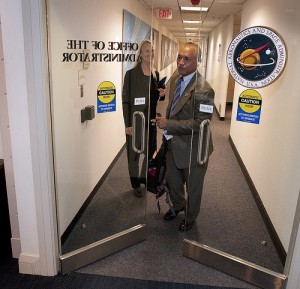Kirk relieves Spock at NASA
Say what you will about Michael Griffin, NASA’s last Administrator—the guy was a true space cadet, wholly committed to the idea of moving humanity beyond Earth orbit for the first time in 40 years. In fact, he seemed impatient with anyone who didn’t share that commitment. He professed to be driven …

Say what you will about Michael Griffin, NASA’s last Administrator—the guy was a true space cadet, wholly committed to the idea of moving humanity beyond Earth orbit for the first time in 40 years. In fact, he seemed impatient with anyone who didn’t share that commitment. He professed to be driven by data only, and famously joked (in his dry-as-lunar-dust way) “I don’t do feelings. Just think of me as Spock.” I had some sympathy with Griffin on that point. Why should the director of the nation’s space program have to gush like Miss America? Yet his inability to communicate with ordinary terrestrials was his political downfall.
Now comes his replacement, Charles Bolden. An astronaut and Major General in the Marines, the new Administrator has the respect of his peers, an easy manner, and, by his own account, a full set of human emotions. Bolden comes from Earth. And he's aware of societal concerns more pressing than “How do we begin the migration into space?” When he spoke to graduates of the Baylor College of Medicine last May, he invoked AIDS ambassador Nkosi Johnson, not Robert Goddard. Since retiring from the Marine Corps, Bolden has thought about fighting sickle cell anemia and improving education for military children, not figuring out how to land on Mars.
That sense of connection to the world beyond NASA should serve him well in his relations with his new boss. President Obama isn't the only one clamoring these days for NASA to be "relevant," and Bolden would be a fool not to listen. The National Academy of Sciences just called on the agency to align itself with "broader national goals" such as environmental stewardship and economic growth. Obama is especially keen on education. He mentions NASA often (at the end of this speech, for example), but usually in the context of inspiring children to study math and science.
Expect that to be a persistent theme during Bolden's time in office. Norman Augustine, who's leading the current review of NASA's human spaceflight program, also counts education as a vital national need, and don't be surprised if his report also challenges the space agency to help restock the nation's supply of scientists and engineers.
There is one problem, though. NASA can't inspire without doing something inspiring. Bolden admitted recently that, whereas school kids used to answer 'yes' when asked if they wanted to become astronauts, "I may see three hands go up" if he asks the same question today. The great challenge for any NASA administrator in 2009 will be revitalizing human spaceflight on a limited budget. If Bolden (and Augustine) can come up with something clever and cool, young people will line up to participate, just as they did in the 1960s. If they can't, well...if you don't build it, they won't come. In which case Bolden's ability to cry could end up being his most useful skill.